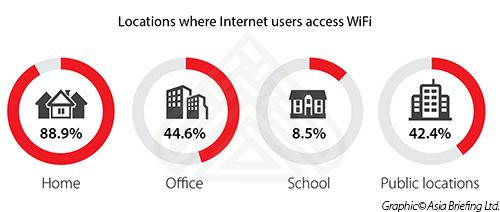Common Internet Challenges in China: An Overview
By Thomas Zhang, IT Director, Dezan Shira & Associates
Editor: Samuel Wrest
Foreign companies operating in China will inevitably face challenges with internet connectivity. Over the past five years, the country’s government has been especially active in its control of the internet, with all Google products, various social media channels, and numerous other websites falling victim to its extensive censorship program. In addition, the Middle Kingdom has one of the worst average internet speeds in Asia, ranking 84th in Akamai’s 2015 State of the internet Report, and monitors access to all non-domestic websites. The impact that this has on foreign firms should not be underestimated. Here, we discuss some of the key challenges that foreign companies face.
Slow international internet speed
For Chinese citizens who access domestic websites and participate in China’s massive e-commerce market, the country’s internet can appear fantastic. Users can purchase a 100Mb optic fiber DSL internet line in their home, or can get 4G mobile network on their phone. This is in stark contrast to 10 years ago, when Chinese citizens could only use 2G mobile network and MMS was largely unaffordable.
That said, for foreign companies who need to access cloud computing networks or non-domestic websites, China’s internet has hardly changed — the speed is slow, connections are unstable and latency is high. Technically speaking, there is a very small network bandwidth between China and overseas countries, and links have a high packet lost rate. This is largely why Akamai, in their 2015 State of the internet Report, ranked China 84th in the world.
![]() RELATED: Information Technology-based Solutions from Dezan Shira & Associates
RELATED: Information Technology-based Solutions from Dezan Shira & Associates
For foreign businesses in China, one obvious ramification of having slow international internet is the accessibility of application systems when transferring real-time data, such as on production monitoring systems or ERP systems. At Dezan Shira & Associates, we have serviced many U.S. and Europeans companies with offices or factories in China that experience operational problems precisely for this reason.

Many popular services are not available
Numerous social media websites and applications are not available in China, including Facebook, Twitter, and WhatsApp. With many Western companies relying on these channels for marketing and client services, the impact on their business can be huge.
In addition, cloud file sharing and transfer platforms such as Dropbox and SendIt do not function well in China. This inevitably leads to data communication problems between operations in China and the overseas HQ, particularly those companies who deal in production and order data.
The complexity of Internet connections
While there are only a limited amount of internet Service Providers in China – namely China Telecom, China Unicom, China Mobile and Great Wall Broadband – selecting a suitable provider is still not an easy option. There are different product lines for family or business, different product types (ADSL based on telephone line, and ADSL based on optic fiber, shared leased line, or dedicated leased line), and different product definitions and prices. Some products will need to be paid monthly, while others will need to be paid yearly.
 This article is an excerpt from the China Briefing Magazine, titled “Internet Challenges & Solutions When Doing Business in China.” In this special edition of China Briefing magazine, we highlight how and why foreign companies will be negatively affected by China’s internet, and provide methods to help solve these problems. We discuss ISP selection, internet connection types, CDNs and VPNs, and internal control systems. Finally, we examine the importance of network security in China and how it can help augment a company’s internet connection. This article is an excerpt from the China Briefing Magazine, titled “Internet Challenges & Solutions When Doing Business in China.” In this special edition of China Briefing magazine, we highlight how and why foreign companies will be negatively affected by China’s internet, and provide methods to help solve these problems. We discuss ISP selection, internet connection types, CDNs and VPNs, and internal control systems. Finally, we examine the importance of network security in China and how it can help augment a company’s internet connection. |
![]()
 An Introduction to Doing Business in China 2015
An Introduction to Doing Business in China 2015
Doing Business in China 2015 is designed to introduce the fundamentals of investing in China. Compiled by the professionals at Dezan Shira & Associates, this comprehensive guide is ideal not only for businesses looking to enter the Chinese market, but also for companies that already have a presence here and want to keep up-to-date with the most recent and relevant policy changes.
 Selling, Sourcing and E-Commerce in China 2016 (First Edition)
Selling, Sourcing and E-Commerce in China 2016 (First Edition)
This guide, produced in collaboration with the experts at Dezan Shira & Associates, provides a comprehensive analysis of all these aspects of commerce in China. It discusses how foreign companies can best go about sourcing products from China; how foreign retailers can set up operations on the ground to sell directly to the country’s massive consumer class; and finally details how foreign enterprises can access China’s lucrative yet ostensibly complex e-commerce market.
 A Guide to China’s Free Trade Zones
A Guide to China’s Free Trade Zones
In this issue of China Briefing magazine, we examine China’s four Free Trade Zones and discuss the differences and strongpoints that exist in each of them. We begin by providing an introduction to the FTZs, and then take an in-depth look at the market access conditions, registration procedures and tax environments of each. Finally, we highlight some of the key considerations that foreign companies should be aware of when choosing an FTZ to invest in.
- Previous Article Starting a Chinese Web Page for Your Company
- Next Article Internet Censorship and China’s New Online Publication Law









